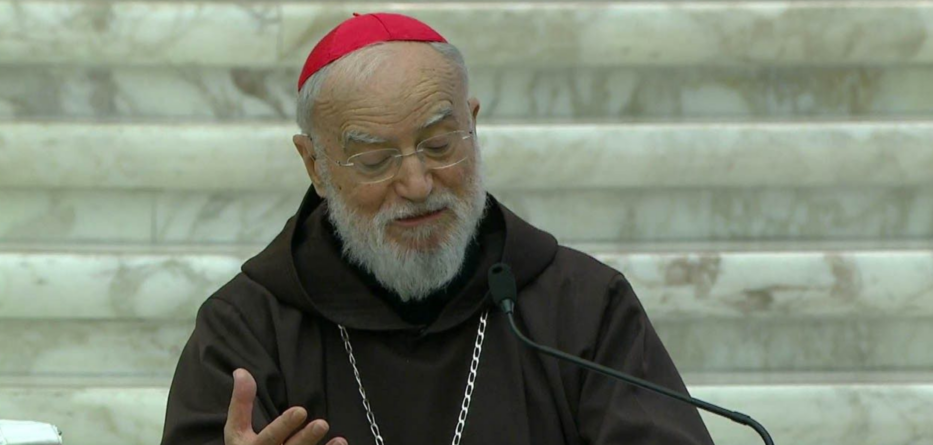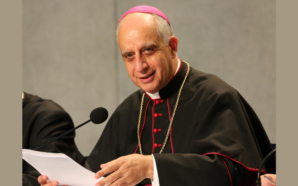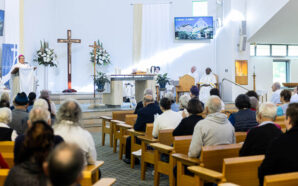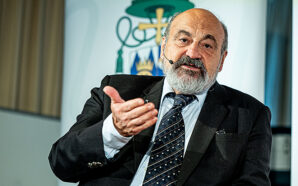In his fifth Lenten sermon for 2022, Cardinal Raniero Cantalamessa, the Preacher to the Papal Household, reflects on service and the example of Jesus who washed the feet of His apostles and lived a life spent for others.
“Why, in the account of the Last Supper, John does not speak of the institution of the Eucharist, but speaks instead of the washing of the feet?” asks the Preacher to the Papal Household, Cardinal Raniero Cantalamessa, at the start of his fifth sermon for the season of Lent this year.
The papal preacher responds by noting that in everything concerning Easter and the Eucharist, John emphasizes the event more than the sacrament – the meaning more than the sign. For the evangelist, the Cardinal notes, “the new Passover does not begin so much in the Upper Room, when the rite that must commemorate it is instituted…rather it begins on the cross when the fact that it is to be commemorated is fulfilled.”
Washing of the feet
Reflecting on the meaning that John attaches to the washing of the feet, the Cardinal notes that it helps us to understand how a Eucharist can be transferred into life and thus, we “imitate in life what we celebrate on the altar.” In the washing of the feet, Jesus wanted to summarize the whole meaning of his life so that it will remain in the memory of the disciples. The gesture tells us, “that the whole life of Jesus, from beginning to end, was a washing of feet, which is, serving humanity.”
“Before the incarnation, there is the pre-existence of Christ, after the incarnation the pro-existence of Christ, that is, an existence lived in favor of others.” With Jesus’ words “Do you too as I did,” he institutes the diakonia (service) elevating it to a fundamental law or a lifestyle and model of all relationships in the Church, as if he were saying in the washing of the feet as in instituting the Eucharist: “do this in memory of me!”.
The doctrine of charisms, in this regard, “is entirely oriented to service” and St. Paul affirms that every particular manifestation of the Spirit is given “for the common good.” “Each one lives according to the grace (chárisma) received, putting it at the service (diakonía) of others” (1 Pt 4, 10). The two things – charisma and ministry, charisma and service – always appear vitally connected to each other, hence, “the Church is charismatic to serve!”.
Spirit of service
The Cardinal explains that the Gospel speaks of service in a way that does not necessarily exclude or disqualify its use in worldly terms (like the way a shopkeeper serves his customer), however, the difference “lies in the reason for the service and in the inner attitude with which it is carried out.” In this regard, “service is not a virtue but it springs from virtue, especially from charity…[it] is a manifestation of the agape, of a love that does not insist on its own interests but on that of others; it does not consist in self-seeking but in giving.”
Besides gratuity, service is also the expression of another aspect of divine agape: humility, the Cardinal explains. Jesus, himself said “You also ought to wash one another’s feet” highlighting that “charity and humility together form evangelical service.” Jesus humbled himself to come from heaven to serve and from the moment of the incarnation, he continued to come down to the point of kneeling down to wash his apostles’ feet.
Discernment of spirits
“The important thing to know is whether we are serving our brothers and sisters or whether, instead, they are serving our purposes,” the Cardinal said. To have a discernment of spirits of our intentions of doing service, “we should be aware of what we do willingly and what we do our best to shirk” and see if “our heart is ready to abandon a noble, prestigious service, if required, for a humble unappreciated one.”
The opposite of a spirit of service is the “wish to domineer, the habit to enforce our wills… authoritarianism,” Cardinal Cantalamessa warns. In another way, “being too attached to our habits and comforts also goes against the spirit of service – a spirit of laxness, as it were.” To counter all of this, “the rule of service is always the same: “Christ did not please himself.”
Service of the Spirit
If, for all Christians, to serve means “living no longer for themselves” (2 Cor 5:15), for pastors it means “not feeding themselves,” the papal preacher stresses. St. Paul also notes in this regard: “Do not dominate over those in your charge but be an example to the flock” (cf. 1 Pet 5:3).
“We must imitate God’s way of acting,” the Cardinal urges. In the washing of the feet, “Jesus was not afraid of compromising his divine dignity, fostering people’s disrespect by disregarding his own privileges and appearing as one among us.” He rather led a simple life, because “simplicity has always been the beginning and the sign of a genuine return to the gospel.” Thus, those, like priests, who are called by vocation to a spiritual service, are called to be servants, first of God and of their brethren.
Jesus, after explaining to the apostles the meaning of the washing of the feet, said to them: “Knowing these things you will be blessed if you do them” (Jn 13:17). Cardinal Cantalamessa notes that we too will be blessed, “if we are not satisfied with knowing these things – namely that the Eucharist pushes us to service and sharing -, but if we put them into practice,” because “the Eucharist is not only a mystery to be consecrated, received and adored, but also a mystery to be imitated.”
Concluding, the papal preacher warns against reducing the gifts we have received to duty, noting that “we have not only received the command to wash the feet and serve our brothers and sisters, we have received the grace of being able to do so.”
With thanks to Benedict Mayaki, SJ, and to Vatican News, where this article originally appeared.








